2021 Robert E. Dickenson Scholarship recipients
Jump to a featured scholar:
- Casey Adkins, Ecology, Evolution, and Conservation Biology, Ph.D.
- Mona Farnisa, Interdisciplinary Environmental Sciences, M.S.
- Weylin Gilbert, Environmental Sciences, Ph.D.
- Mia Goldman, Natural Resources and Environmental Science, M.S.
- Elizabeth Jennings, Biochemistry, Ph.D.
- Nathan Jero, Animal & Rangeland Science, M.S.
- Arielle Koshkin, Graduate Program of Hydrologic Science, M.S.
- Tara McKinnon, Graduate Program of Hydrologic Science, Ph.D.
- Elise Pletcher, Ecology Evolution & Conservation Biology, Ph.D.
- Kayleigh Robichaux, Biochemistry, Ph.D.
- Keenan Seto, Natural Resources and Environmental Science, M.S.
- Jack Tarricone, Graduate Program of Hydrologic Science, Ph.D.
- Anna Tatarko, Ecology, Evolution, and Conservation Biology, Ph.D.
- Casey White, Animal and Rangeland Science, M.S.
- Spencer Whitman, Graduate Program of Hydrologic Science, Ph.D.
Additional scholars:
- Russell Godkin, Animal and Rangeland Science, M.S.
- Jack Griffin, Chemical Engineering, Ph.D.
- Emily Medina, Biochemistry, Ph.D.
- Ciara Sheets, Ecology, Evolution and Conservation Biology, M.S.
- Chrystle Weigand, Biochemistry, Ph.D.
Casey Adkins, Ecology, Evolution, and Conservation Biology, Ph.D.
 Casey Adkins is a Ph.D. student studying how environmental, genomic, and gastrointestinal microbiome variables influence individual herbivores' ability to consume, digest, and excrete toxic plant secondary compounds. Understanding how these mechanisms influence individuals allow for the inference of inter- and intraspecific population interactions. Interactions like competition and evolutionary forces such as gene flow and selection impact the ecological and evolutionary trajectories of species. Casey graduated with her master's degree in biology at the Missouri State University then joined Dr. Marjorie Matocq's lab for her doctoral degree. In her spare time, she enjoys reading, hiking, camping, and gardening.
Casey Adkins is a Ph.D. student studying how environmental, genomic, and gastrointestinal microbiome variables influence individual herbivores' ability to consume, digest, and excrete toxic plant secondary compounds. Understanding how these mechanisms influence individuals allow for the inference of inter- and intraspecific population interactions. Interactions like competition and evolutionary forces such as gene flow and selection impact the ecological and evolutionary trajectories of species. Casey graduated with her master's degree in biology at the Missouri State University then joined Dr. Marjorie Matocq's lab for her doctoral degree. In her spare time, she enjoys reading, hiking, camping, and gardening.
Mona Farnisa, Interdisciplinary Environmental Sciences, M.S.
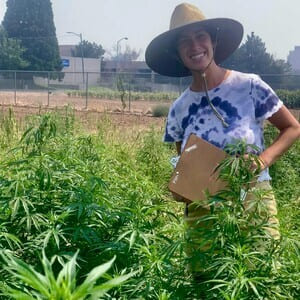 Mona is a second-year master's student in the Sustainable Horticulture Lab. She researches field- and greenhouse-grown industrial hemp, aiming to understand how varying nitrogen fertilization levels influence hemp development, flowering time, and cannabinoid content. Her research involves analyzing for CBD and THC in hemp flowers during the flowering stage and post-harvest and tracking the development of these compounds among different hemp varieties. She is also investigating whether nitrogen deficiencies can be identified through the use of non-destructive chlorophyll leaf sensors. With her research, Mona hopes to assist hemp farmers in identifying optimal harvest time - when maximum CBD is reached while staying below the federal THC limit of 0.3%.
Mona is a second-year master's student in the Sustainable Horticulture Lab. She researches field- and greenhouse-grown industrial hemp, aiming to understand how varying nitrogen fertilization levels influence hemp development, flowering time, and cannabinoid content. Her research involves analyzing for CBD and THC in hemp flowers during the flowering stage and post-harvest and tracking the development of these compounds among different hemp varieties. She is also investigating whether nitrogen deficiencies can be identified through the use of non-destructive chlorophyll leaf sensors. With her research, Mona hopes to assist hemp farmers in identifying optimal harvest time - when maximum CBD is reached while staying below the federal THC limit of 0.3%.
Mona has worked on various diversified small farms and considers herself a part-time farmer. Her previous farming experience has allowed her to combine her on-the-ground field knowledge with her research. She is passionate about supporting locally grown food and small farms and encourages others to volunteer at their local community farm. Mona hopes to see more public support and protections for farmworkers.
Weylin Gilbert, Environmental Sciences
 Weylin is a second-year Ph.D. student in the interdisciplinary Environmental Sciences program, as well as a member of the Environmental Tomography and Emerging Technologies Lab. His current research projects include the spatial quantification of environmental resilience in response to major drought events, and the creation of a statewide atlas of Nevada’s agricultural resources, both primarily using multispectral satellite imaging datasets. Weylin’s academic interests include climate change modeling, gravimetric sensing and multidisciplinary integration of spatial data with sociological, historical, and economic models.
Weylin is a second-year Ph.D. student in the interdisciplinary Environmental Sciences program, as well as a member of the Environmental Tomography and Emerging Technologies Lab. His current research projects include the spatial quantification of environmental resilience in response to major drought events, and the creation of a statewide atlas of Nevada’s agricultural resources, both primarily using multispectral satellite imaging datasets. Weylin’s academic interests include climate change modeling, gravimetric sensing and multidisciplinary integration of spatial data with sociological, historical, and economic models.
Mia Goldman, Natural Resources and Environmental Science, M.S.
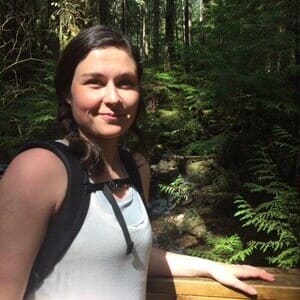 Mia is a second-year MS student in the Applied Population Ecology Lab. Her project is part of a long-term monitoring study of American pika at multiple National Parks across the northwestern US. Mia is focused on improving the sensitivity and specificity of monitoring protocols for this species. In addition, Mia is using avian passive bioacoustic monitoring data collected from 2017-2020 across northern Nevada to better understand habitat associations for a variety of bird species and to assess avian responses to conifer removal treatments. Previously, Mia has worked on a wide variety of taxa and projects including interactions and spatial ecology of large carnivores, mule deer neonate survival, Mexican gray wolf conservation, and faunal community responses to conifer removal in the Great Basin. Prior to joining the Natural Resources and Environmental Sciences MS program, Mia earned a B.A. at St. John's College in New Mexico and taught K-12 in both public and private institutions.
Mia is a second-year MS student in the Applied Population Ecology Lab. Her project is part of a long-term monitoring study of American pika at multiple National Parks across the northwestern US. Mia is focused on improving the sensitivity and specificity of monitoring protocols for this species. In addition, Mia is using avian passive bioacoustic monitoring data collected from 2017-2020 across northern Nevada to better understand habitat associations for a variety of bird species and to assess avian responses to conifer removal treatments. Previously, Mia has worked on a wide variety of taxa and projects including interactions and spatial ecology of large carnivores, mule deer neonate survival, Mexican gray wolf conservation, and faunal community responses to conifer removal in the Great Basin. Prior to joining the Natural Resources and Environmental Sciences MS program, Mia earned a B.A. at St. John's College in New Mexico and taught K-12 in both public and private institutions.
Elizabeth Jennings, Biochemistry, Ph.D.
 Elizabeth is a second-year Biochemistry Ph.D. student in the Molecular Biosciences graduate program. She completed her Bachelor degrees in Biology and Nutrition and a minor in Biochemistry at the University of Nevada, Reno prior to beginning her graduate career. Elizabeth joined Dr. Robert Ryan's lab following laboratory rotations. The Ryan lab studies a unique property of several inborn errors of metabolism that affect mitochondrial function. Her project focuses on an unusual and distinguishing feature of these disorders, termed 3-methylglutaconic aciduria. She is studying the biochemical basis for 3MGC acid accumulation in the urine of subjects that harbor these gene defects. Her goal is to elucidate the acetyl CoA diversion pathway as the biochemical basis for 3MGC aciduria.
Elizabeth is a second-year Biochemistry Ph.D. student in the Molecular Biosciences graduate program. She completed her Bachelor degrees in Biology and Nutrition and a minor in Biochemistry at the University of Nevada, Reno prior to beginning her graduate career. Elizabeth joined Dr. Robert Ryan's lab following laboratory rotations. The Ryan lab studies a unique property of several inborn errors of metabolism that affect mitochondrial function. Her project focuses on an unusual and distinguishing feature of these disorders, termed 3-methylglutaconic aciduria. She is studying the biochemical basis for 3MGC acid accumulation in the urine of subjects that harbor these gene defects. Her goal is to elucidate the acetyl CoA diversion pathway as the biochemical basis for 3MGC aciduria.
Nathan Jero, Animal & Rangeland Science, M.S.
 Nathan is pursuing his M.S. in rangeland ecology. His research is focused on testing the capabilities of virtual fencing systems at the ranch scale, including their promise for intensive grazing management of riparian areas. He is also examining the survival of native seeds during digestion by ruminants, working towards the development of a seed coating to allow for passive fecal reseeding of degraded rangelands. He grew up in southwestern Ohio and left as soon as he could to pursue a degree in Rangeland Ecology & Management at the University of Idaho, where he graduated in 2019. In his spare time, he enjoys reading history and baking bread.
Nathan is pursuing his M.S. in rangeland ecology. His research is focused on testing the capabilities of virtual fencing systems at the ranch scale, including their promise for intensive grazing management of riparian areas. He is also examining the survival of native seeds during digestion by ruminants, working towards the development of a seed coating to allow for passive fecal reseeding of degraded rangelands. He grew up in southwestern Ohio and left as soon as he could to pursue a degree in Rangeland Ecology & Management at the University of Idaho, where he graduated in 2019. In his spare time, he enjoys reading history and baking bread.
Arielle Koshkin, Graduate Program of Hydrologic Science, M.S.
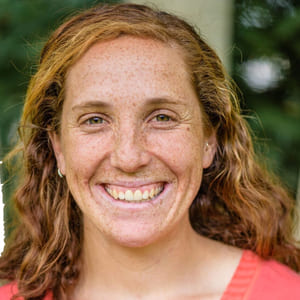 Arielle is a second-year master's student in the Graduate Program of Hydrological Science and a member of the Computational Mountain Studies Research Group. Her research focuses on the impacts of massive wildfire on the snowpack in the Sierra Nevadas and in turn what this means for our water resources after a wildfire burns a large percentage of the headwaters of important watersheds. Specifically, she is interested in understanding how heterogeneity in burn severity impacts snowmelt rates and water content in the snowpack. Arielle has a Bachelor's degree from Carleton College in southern Minnesota. Since college, Arielle has taught high schools science, led a SnowEx field campaign, work for a local Land Trust in Colorado, and ran international experiential education programs for high school students.
Arielle is a second-year master's student in the Graduate Program of Hydrological Science and a member of the Computational Mountain Studies Research Group. Her research focuses on the impacts of massive wildfire on the snowpack in the Sierra Nevadas and in turn what this means for our water resources after a wildfire burns a large percentage of the headwaters of important watersheds. Specifically, she is interested in understanding how heterogeneity in burn severity impacts snowmelt rates and water content in the snowpack. Arielle has a Bachelor's degree from Carleton College in southern Minnesota. Since college, Arielle has taught high schools science, led a SnowEx field campaign, work for a local Land Trust in Colorado, and ran international experiential education programs for high school students.
Tara McKinnon, Graduate Program of Hydrologic Science, Ph.D.
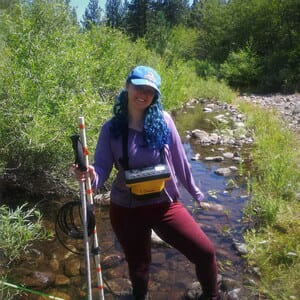 Tara received her undergraduate education at the University of California, Santa Barbara in Aquatic Biology in 2019 and is currently a 3rd year PhD student. She worked for 4 years as a a lab and field research technician in plant and insect laboratories, both in the private and academic sectors. Tara grew up working on ranches and farms in Northern California and is the first in her family to receive a college education. Her graduate research focuses on understanding the influences of stream water removal, during the agricultural growing season, on multiple feeding groups (insects, fish, and birds). This project works directly with stakeholders to achieve responsible and scientifically directed management of these water resources and the surrounding habitat. In her spare time, Tara enjoys hiking, volunteering, and crafting.
Tara received her undergraduate education at the University of California, Santa Barbara in Aquatic Biology in 2019 and is currently a 3rd year PhD student. She worked for 4 years as a a lab and field research technician in plant and insect laboratories, both in the private and academic sectors. Tara grew up working on ranches and farms in Northern California and is the first in her family to receive a college education. Her graduate research focuses on understanding the influences of stream water removal, during the agricultural growing season, on multiple feeding groups (insects, fish, and birds). This project works directly with stakeholders to achieve responsible and scientifically directed management of these water resources and the surrounding habitat. In her spare time, Tara enjoys hiking, volunteering, and crafting.
Elise Pletcher, Ecology Evolution & Conservation Biology, Ph.D.
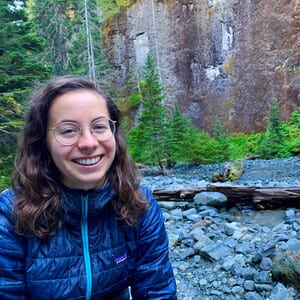 Elise is a first year PhD student in the Ecology Evolution and Conservation Biology program. Originally from the Pacific Northwest, Elise received a BS in Biology from the University of Washington and most recently completed her MS in Geography at the University of British Columbia. She also brings experience in community science and public outreach acquired while serving as an AmeriCorps service member at a publicly owned marine aquarium. Elise is broadly interested studying landscape and regional scale shifts in tree abundance and the implications that shifts in vegetation structure have on the future resilience of these landscapes. Specifically, her dissertation research will focus on using remotely sensed data to study the demographic drivers of pinyon-juniper woodland expansion within the Great Basin.
Elise is a first year PhD student in the Ecology Evolution and Conservation Biology program. Originally from the Pacific Northwest, Elise received a BS in Biology from the University of Washington and most recently completed her MS in Geography at the University of British Columbia. She also brings experience in community science and public outreach acquired while serving as an AmeriCorps service member at a publicly owned marine aquarium. Elise is broadly interested studying landscape and regional scale shifts in tree abundance and the implications that shifts in vegetation structure have on the future resilience of these landscapes. Specifically, her dissertation research will focus on using remotely sensed data to study the demographic drivers of pinyon-juniper woodland expansion within the Great Basin.
Kayleigh Robichaux, Biochemistry and Molecular Biology, Ph.D.
 Kayleigh is a second-year predoctoral student in the Department of Biochemistry and Molecular Biology. Kayleigh graduated with her dual Bachelor's/Master's of Science in Biotechnology in Spring 2020, and with a Bachelor's of Science in Molecular Microbiology and Immunology in Spring 2019 with a minor in Community Health Sciences. She has worked under the advisement of Associate Professor Dr. Ian Wallace for the past year where she investigates putative glycosyltransferase enzymes that are implicated in plant cell wall biosynthesis and plant reproduction by assessing enzymatic activity and kinetics, as well as potential protein-protein interactions.
Kayleigh is a second-year predoctoral student in the Department of Biochemistry and Molecular Biology. Kayleigh graduated with her dual Bachelor's/Master's of Science in Biotechnology in Spring 2020, and with a Bachelor's of Science in Molecular Microbiology and Immunology in Spring 2019 with a minor in Community Health Sciences. She has worked under the advisement of Associate Professor Dr. Ian Wallace for the past year where she investigates putative glycosyltransferase enzymes that are implicated in plant cell wall biosynthesis and plant reproduction by assessing enzymatic activity and kinetics, as well as potential protein-protein interactions.
Keenan Seto, Natural Resources and Environmental Science, M.S.
 Keenan received his B.S. in Natural Resource Management and minor in Economics from Colorado State University in 2015. He is a second-year M.S. student researching the impacts of stream and river salinization from road deicing salts and agriculture runoff on water quality and microbial communities. Before coming to the University, he worked in rural Colorado and Wyoming for government agencies on a variety of natural resource projects, where he came to appreciate the work of farmers and ranchers as collaborators in environmental protection. He has also volunteered for a non-governmental organization in Uganda to improve agricultural and hygienic practices of families affected by HIV/AIDS. Keenan is grateful for receiving the Dickenson Scholarship and hopes his work will provide knowledge on how freshwater systems respond to anthropogenic effects.
Keenan received his B.S. in Natural Resource Management and minor in Economics from Colorado State University in 2015. He is a second-year M.S. student researching the impacts of stream and river salinization from road deicing salts and agriculture runoff on water quality and microbial communities. Before coming to the University, he worked in rural Colorado and Wyoming for government agencies on a variety of natural resource projects, where he came to appreciate the work of farmers and ranchers as collaborators in environmental protection. He has also volunteered for a non-governmental organization in Uganda to improve agricultural and hygienic practices of families affected by HIV/AIDS. Keenan is grateful for receiving the Dickenson Scholarship and hopes his work will provide knowledge on how freshwater systems respond to anthropogenic effects.
Jack Tarricone, Graduate Program of Hydrologic Science, Ph.D.
![]() Jack is a Vermont native who graduated from the University of Colorado, Boulder, in 2016 with a B.A. in Geography. Upon moving to Colorado, he became interested in hydrology and began conducting hydrologic modeling research while abroad in Australia. Jack is currently a third-year Ph.D. student in the Graduate Program of Hydrologic Science. His work focuses on developing and optimizing a range of remote sensing techniques to quantify mountain snowpack. The precise snow information remote sensing provides allows for better estimation and management of water resources. Understanding the linkages between mountain snowpack and water will become increasingly important as climate change and drought impact the Western U.S. He is part of the NASA SnowEx, a national campaign to address the critical gaps in snow remote sensing knowledge.
Jack is a Vermont native who graduated from the University of Colorado, Boulder, in 2016 with a B.A. in Geography. Upon moving to Colorado, he became interested in hydrology and began conducting hydrologic modeling research while abroad in Australia. Jack is currently a third-year Ph.D. student in the Graduate Program of Hydrologic Science. His work focuses on developing and optimizing a range of remote sensing techniques to quantify mountain snowpack. The precise snow information remote sensing provides allows for better estimation and management of water resources. Understanding the linkages between mountain snowpack and water will become increasingly important as climate change and drought impact the Western U.S. He is part of the NASA SnowEx, a national campaign to address the critical gaps in snow remote sensing knowledge.
Anna Tatarko, Ecology, Evolution, and Conservation Biology, Ph.D.
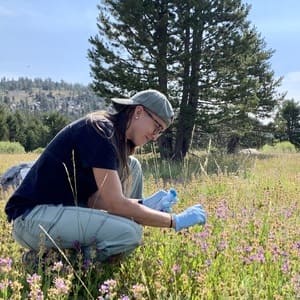 Anna graduated from the University of Kansas with her B.S. in Environmental Studies and then from the University of Nebraska with her M.Sc. in Biological Sciences. She is now a PhD candidate in the Ecology, Evolution and Conservation Biology program where she studies the impacts of agricultural chemicals on pollinator health. Her recent work has examined the disruptions these chemicals may cause to the bee and plant microbiomes, and how possible disruptions may scale to effect bee-microbe-plant interactions. Given recent understanding of how important microbes are to both pollinator health and plant productivity, understanding how agricultural chemical complexity can alter bee-microbe-plant interactions is a pressing question for maintaining healthy pollinators in agricultural ecosystems. Her interest in pollinators began with her conservation work as an undergraduate studying pollinator community restoration efforts. The difficulty of this work impressed upon Anna the importance of working to maintain these mutualisms, which she now does by studying how agricultural chemicals may be harmful for pollinator health.
Anna graduated from the University of Kansas with her B.S. in Environmental Studies and then from the University of Nebraska with her M.Sc. in Biological Sciences. She is now a PhD candidate in the Ecology, Evolution and Conservation Biology program where she studies the impacts of agricultural chemicals on pollinator health. Her recent work has examined the disruptions these chemicals may cause to the bee and plant microbiomes, and how possible disruptions may scale to effect bee-microbe-plant interactions. Given recent understanding of how important microbes are to both pollinator health and plant productivity, understanding how agricultural chemical complexity can alter bee-microbe-plant interactions is a pressing question for maintaining healthy pollinators in agricultural ecosystems. Her interest in pollinators began with her conservation work as an undergraduate studying pollinator community restoration efforts. The difficulty of this work impressed upon Anna the importance of working to maintain these mutualisms, which she now does by studying how agricultural chemicals may be harmful for pollinator health.
Casey White, Animal and Rangeland Science
 While earning her Bachelor of Science degree in Geology with a minor in Biology from North Carolina State University, Casey became passionate about environmental justice, climate science, and geospatial analytics. It was with these passions in mind that she joined the University of Nevada, Reno as a master’s student in the Animal Veterinary, and Rangeland Sciences department under the mentorship of Robert Washington-Allen, Ph.D. The purpose of her research through the Environmental Tomography and Emerging Technologies Laboratory is to address the knowledge gap of the amount and dynamics of carbon stocks and fluxes, or more commonly yield and production, on Native American lands in the United States. Her primary focus on Native American lands is driven by the existing bias that these lands have lower productivity because they are open access and thus subject to the “Tragedy of the Commons.”
While earning her Bachelor of Science degree in Geology with a minor in Biology from North Carolina State University, Casey became passionate about environmental justice, climate science, and geospatial analytics. It was with these passions in mind that she joined the University of Nevada, Reno as a master’s student in the Animal Veterinary, and Rangeland Sciences department under the mentorship of Robert Washington-Allen, Ph.D. The purpose of her research through the Environmental Tomography and Emerging Technologies Laboratory is to address the knowledge gap of the amount and dynamics of carbon stocks and fluxes, or more commonly yield and production, on Native American lands in the United States. Her primary focus on Native American lands is driven by the existing bias that these lands have lower productivity because they are open access and thus subject to the “Tragedy of the Commons.”
Spencer Whitman, Graduate Program of Hydrologic Science, Ph.D.
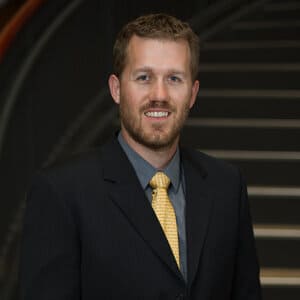 Spencer is a fourth year Ph.D. student of Hydrogeology in the Graduate Program of Hydrologic Sciences. Spencer earned his B.S. and M.S. degrees in Hydrogeology at The University of Texas at Austin and The University of Nevada Reno, respectively. Spencer's Ph.D. research focuses on developing workflows to characterize environmental risks at abandoned mine lands, which often lack sufficient data and/or funding for more traditional investigation techniques. Spencer is investigating the potential impacts of a historic unlined tailings impoundment to groundwater at the Caselton Mine Tailings Impoundment in Lincoln County, NV. Spencer's research integrates laboratory experiments, satellite remote sensing analysis, and numerical simulation of fluid flow and chemical processes to characterize the potential impacts of abandoned mine wastes on groundwater.
Spencer is a fourth year Ph.D. student of Hydrogeology in the Graduate Program of Hydrologic Sciences. Spencer earned his B.S. and M.S. degrees in Hydrogeology at The University of Texas at Austin and The University of Nevada Reno, respectively. Spencer's Ph.D. research focuses on developing workflows to characterize environmental risks at abandoned mine lands, which often lack sufficient data and/or funding for more traditional investigation techniques. Spencer is investigating the potential impacts of a historic unlined tailings impoundment to groundwater at the Caselton Mine Tailings Impoundment in Lincoln County, NV. Spencer's research integrates laboratory experiments, satellite remote sensing analysis, and numerical simulation of fluid flow and chemical processes to characterize the potential impacts of abandoned mine wastes on groundwater.